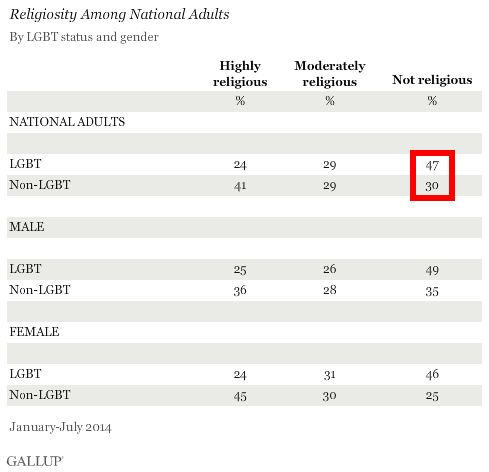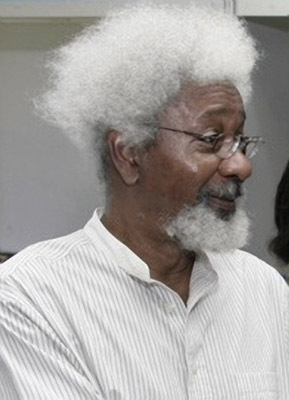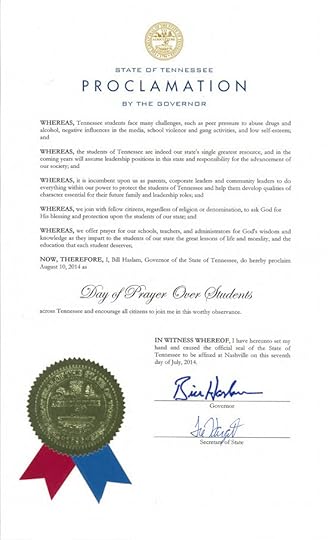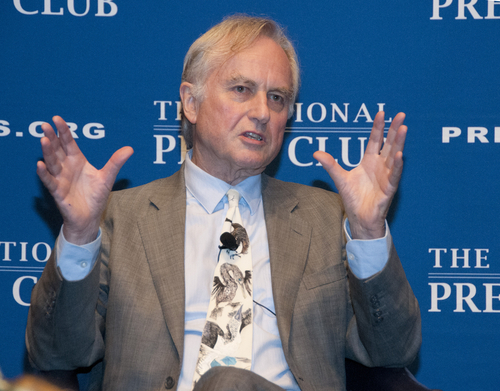Hemant Mehta's Blog, page 1955
August 12, 2014
Comedian Ian Harris Jokes About The God Delusion and the Meaning of “Theory”
Comedian Ian Harris has a new special out called “Critical & Thinking” with plenty of bits about religion and science. The clips below focus on The God Delusion and evolution. Really great material:
If you’d like to watch the full special, it’s available beginning today on iTunes, and you can see it on Video on Demand & Pay-Per-View (depending on your cable provider).
You can also download the album on Amazon.
August 11, 2014
RIP, Robin Williams
Well, shit. Comedian, actor, and all-around lovable personality Robin Williams is dead. Paul Fidalgo reminds us that no amount of success can overcome depression regardless of what we think, and JT Eberhard offers an additional take on the mental health aspect of his passing.
I don’t have much to add to what they’re saying. But you have to appreciate anyone who’s privately faithful but who never hesitated satirizing religion. (He was an Episcopalian who referred to the faith as “Catholic lite.”)
Enjoy these clips from his 2002 LIVE on Broadway special in which he takes on the Catholic Church and biblical miracles:
(Image via DFree / Shutterstock.com)
Friendly Atheist Podcast Episode 9: Joe Jervis, JoeMyGod.com
Our latest podcast guest is Joe Jervis, the prolific blogger at Joe. My. God.

Jervis runs quite possibly the most popular personal blog about LGBT issues in the world. He’s been writing on the site for more than 10 years — a lifetime in the Internet world. His site has received multiple awards from groups like GLAAD, CBS News and The Village Voice. We spoke with Joe about how he manages to cover seemingly *everything* in the LGBT world, his unique vacation habits, and the biggest problems in his community.
We’d love to hear your thoughts on the podcast. If you have any suggestions for people we should chat with, please leave them in the comments, too.
You can subscribe to the podcast on iTunes, get the MP3 directly, or just listen to the whole thing below.
And if you like what you’re hearing, please consider supporting this site on Patreon and leaving us a positive rating!
Gallup Says LGBT Americans Are Less Religious Than the General Public. (In Related News, the Sun is Hot)
According to a new Gallup poll that will surprise exactly none of you, LGBT people are significantly less religious than the general population:
Why might that be the case? The obvious reason is that many religious traditions see homosexuality as a problem to solve, not a reality to embrace, and why would LGBT individuals want to be part of those traditions?
But Gallup’s Frank Newport offers additional possibilities:
Other possible explanations have to do less with church doctrine and more with the demographics of the LGBT population. LGBT individuals may be more likely to live in areas and cities where religion and religious service attendance are less common, and may adopt the practices of those with whom they share geography.
The LGBT population skews substantially younger than the non-LGBT population, and because younger people are the least religious of any age group in the U.S. today, age could be an explanation. However, a look at the relationship between LGBT status and religiousness across age groups shows that while older individuals in both groups are more religious than those who are younger, differences in religiousness are evident within all three age groups. In short, even if the LGBT population had the same age divisions as the non-LGBT population, the former’s lower levels of religiousness would most likely still be evident.
Either way, religious people do themselves a disservice every time a pastor condemns same-sex marriage, or a Christian baker refuses to make a cake for a gay wedding, or a right wing mouthpiece equates homosexuality with pedophilia. They’re not just alienating LGBT worshipers; they’re alienating straight allies, too.
Lucky for us, churches aren’t about to stop the bleeding.
Are Silent, Moderate Religious Leaders Co-Responsible For Fundamentalists’ Atrocities?
Moderate religious leaders bear serious responsibility for sectarian strife if they haven’t habitually spoken out against it.
That’s the take of Nobel prize-winning poet and playwright Wole Soyinka, who spoke to the annual World Humanist Congress via a video address yesterday.
Soyinka argued that
… even moderate religious leaders may be “vicariously liable” for sectarian hatred if they have failed to argue against it.
The actions of the Islamist extremists of Boko Haram — bombing churches, killing civilians and abducting girls — are a warning to the world, Soyinka said.
“The conflict between humanists and religionists has always been one between the torch of enlightenment and the chains of enslavement,” said Soyinka. “Those chains are not merely visible, but cruelly palpable. All too often they lead directly to the gallows, beheadings, to death under a hail of stones. In parts of the world today, the scroll of faith is indistinguishable from the roll call of death.”
The 80-year-old Nigerian author condemned the ever-popular No True Scotsman fallacy as a stale cop-out:
Boko Haram’s members considered abducting 200 girls to be “virtuous” and moderate Muslims could not simply disavow their actions with “pious incantations” that “these are not the true followers of the faith”.
“We have to ask such leadership penitents: ‘Were there times when you kept silent while such states of mind, overt or disguised, were seeding fanaticism around you? Are you vicariously liable?” said Soyinka.
I hesitate to lay blame for religious violence at the feet of believers who haven’t — and wouldn’t — hurt a fly. Then again, silence can make a bad situation terrible, and a terrible situation deadly. Does Soyinka’s argument resonate with you? Why or why not?
(Image via Wikipedia)
August 10, 2014
20 Short Arguments Against God’s Existence
The video below, part of The Atheist Voice series, discusses 20 short arguments against God’s existence:
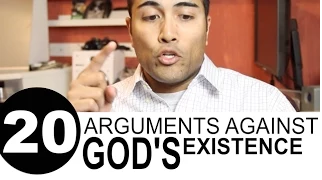
(I should mention, regarding the religious music and movies, I was referring to contemporary Christian pop culture.)
A rough transcript of the video can be found on the YouTube page in the “About” section.
We’d love to hear your thoughts on the project — more videos will be posted soon — and we’d also appreciate your suggestions as to which questions we ought to tackle next!
And if you like what you’re seeing, please consider supporting this site on Patreon.
Some Evangelical Christian Women Are Rethinking the Idea of Virginity Until Marriage
I love that this is getting talked about. Evangelical purity culture is so ridden with shame and unhealthy, irrational obsession over virginity (hey guys! scientifically speaking, it doesn’t even EXIST), and women are starting to speak out about how waiting until marriage didn’t help them.
Beth Morey wrote a beautiful, heartbreaking piece recently about coming to terms with her own lack of knowledge about her own sexuality because of purity culture teachings:
I feel betrayed.
This is a portrait of the woman, betrayed.
The betrayal, the regret, was born on my wedding night. The night that finally — f i n a l l y — after twenty six years of life, it was acceptable for me to be a sexual being. Not too sexual, of course, but sex was finally permissible.
My husband and I came as virgins to the marriage bed. And —
we walked away virgins.
We did not have sex until four months after our wedding.
I did not enjoy sex for years after our wedding.
And we didn’t learn why we couldn’t have sex until many weeks after our wedding.This wounds us, wounds my husband and I to this day.
And xoJane just ran a piece last week with a similar story:
For more than a decade, I wore my virginity like a badge of honor. My church encouraged me to do so, saying my testimony would inspire other young girls to follow suit. If the topic ever came up in conversation, I was happy to let people know that I had taken a pledge of purity.
…
An unhealthy mixture of pride, fear, and guilt helped me keep my pledge until we got married. In the weeks before our wedding, I often got congratulated on keeping my virginity for so long. The comments ranged from curious (how in the world did you manage?) to downright disgusting (I bet you’re going to have one busy wedding night!). I let them place me on the pedestal as their virginal, perfect-Christian-girl mascot.
As someone who has a similar story (waited, did everything “right,” still got divorced, didn’t benefit from waiting in any way other than having one less thing authority figures were trying to control about my life before marriage), I love that these conversations are happening. Shame is debilitating and destructive. The more we talk about this, the fewer people will be bound up in shame and fear.
(Image via Shutterstock)
Tennessee Governor Proclaims Today as “Day of Prayer Over Students Across Tennessee”
Tennessee Governor Bill Haslam has declared today a “Day of Prayer Over Students Across Tennessee,” which may literally be the least helpful way to help students across the state.
The proclamation, signed a few days ago at the request of the Christian group First Priority, declares that prayer is the solution to some of the biggest problems students face:

Whereas, Tennessee students face many challenges, such as peer pressure to abuse drugs and alcohol, negative influences in the media, school violence and gang activities, and low self-esteem…
…
Whereas, it is incumbent upon us as parents, corporate leaders and community leaders to do everything within our power to protect the students of Tennessee and help them develop qualities of character essential for their future family and leadership roles…
Whereas, we join with fellow citizens, regardless of religion or denomination, to ask God for His blessing and protection upon the students of our state…
Whereas, we offer prayer for our schools, teachers, and administrators for God’s wisdom and knowledge as they impart to the students of our state the great lessons of life and morality, and the education that each student deserves…
Now, therefore, I, Bill Haslam, Governor of the State of Tennessee, do hereby proclaim August 10, 2014 as
Day of Prayer Over Students
across Tennessee and encourage all citizens to join me in this worthy observance.
First Priority is urging volunteers to visit several schools around the state tonight and “cover the campus in prayer for an hour.”
It may be legal, but it’s just plain silly. And, let’s be honest, it’s completely ineffective. (In case you’re wondering, this proclamation isn’t a church/state issue. Governors in other states have also signed “Day of Reason” proclamations at the request of Humanist groups.)
By the way, in 2012, Tennessee was ranked in the bottom ten states in terms of education. Maybe praying over the schools instead of offering more tangible solutions is one of the reasons for that.
(Thanks to Brian for the link)
Richard Dawkins is Still an Asset to the Atheist Movement
A couple of days ago, Kimberly Winston at Religion News Service wrote a story about whether Richard Dawkins was an asset or liability for the atheist “movement.”
The story sure makes it seem like Dawkins is a liability, with the majority of quotations coming from people who think he does a lot of damage to our cause. I’m mentioned in the piece and even I come off as critical of him:
And it isn’t only women atheists whom Dawkins upset. Writing on The Friendly Atheist, Hemant Mehta said: “I’m a fan of Richard Dawkins. I know he means well. But damn, it’s annoying having to defend him. More importantly, I shouldn’t have to!”
I wrote that, to be sure, but I don’t think my thoughts on Dawkins are properly captured in that one passage. So I want to clarify what I sent to the reporter because, unlike most of the others quoted in the piece, I don’t think Dawkins hurts the image of atheism (even if he has some missteps along the way):
I think Dawkins is still an asset to movement atheism. His books will live on long past any Twitter controversy (even those of his own making) and — let’s face it — most people are completely unaware of his polarizing presence online. What we need to recognize is that he’s a great communicator when he has the chance to explain himself fully, which he has done throughout his career in his books.
However, Dawkins has not figured out how to master sound bites. On Twitter, where he’s limited to one-liners, he thinks people will focus on the broader context of what he’s saying, not the particulars. Those of us who primarily write online know better than that. Dawkins also hurts himself by assuming rational people everywhere will think just as he does, even on controversial issues. As someone who generally knows what he’s trying to say, even I often cringe at the way he goes about making his case.
Richard Dawkins should stick to books. The Internet isn’t working out for him.
I would also add that the Internet controversies involving Dawkins tend to focus on statements he makes that he probably thinks are innocuous and sensible. It’s not that he’s trying to be controversial, but the comments often blow up in his face and he doesn’t see it coming until it’s too late. Then, in an attempt to make things right, he just digs himself a deeper grave. (And in some cases, it’s like he can’t win because people refuse to ever give him the benefit of the doubt.)
So, yes, Dawkins is still an asset for atheism… even if he hasn’t mastered the art of speaking in 140 characters.
By the way, I don’t blame Winston for not using what I said. Usually, when someone in the media asks for a quotation, I’m well aware that space constraints mean the final product will either include only a portion of my comments at best.
(Image via Albert H. Teich / Shutterstock.com)
Alabama Atheist Opposes “In God We Trust” Plaque in Mobile County Building and Receives Death Threats on Facebook
This week, several non-Christians spoke up in front of the Mobile County Commission (in Alabama) to request they put up displays reading things like “In Reason We Trust.” It was in response to a recent vote to put “In God We Trust” on a plaque in the city’s Administration Building. Despite the pushback, the Commission denied those requests, saying only the Christian phrase would go up.
Amanda Scott, a member of the Mobile Atheist Community, was one of the people who fought against the Christian privilege:
Amanda wasn’t the only person who opposed the “In God We Trust” display, but it seemed like she was the most prominent, leading WKRG News to ask Facebook readers a question directly about her:
What are your thoughts on a local woman who wants to see an Athiest motto placed next to the words “In God We Trust” at Government Plaza?
Before we move on, let’s talk about how shitty that question is.
Instead of focusing on the topic at hand — the display itself — the question pivots to how readers feel about one specific person who argued against it. That’s just asking for trouble. And commenters responded in kind, with a mix of death threats and nasty comments. We even have the screenshots to prove it:














There were more than 2,500 comments at one point on Saturday, though it’s since been whittled down to about 1,200.
Even on an Al.com article about the threats, commenters don’t seem to be much better. One wrote, “I hope she continues to get more grief mail. Its no less than she deserves.”
Someone on Facebook (an atheist ally, I presume) began making collages of all the nasty things that were being said about Amanda to document all this “Christian Love.”
In spite of all those awful statements, Amanda is staying strong. She’s not going to give up this fight even if some locals have shown they’ll stoop to disgusting depths to get her to stop:
“I tried to be respectful in my testimony and my interview, but I was met with hateful comments and messages from members of the local community attacking my personal character and even my physical appearance.
As for if she feels dissuaded, she said no.
“I will not allow the hatred to discourage me from continuing to defend the constitutional principle of the separation of church and state and the civil rights of atheists here in the city of Mobile and the state of Alabama,” she said.
There’s some courage and class for you. And it’s a lot more than we can expect from some of the Christians who think their faith should be promoted by the government.
Hemant Mehta's Blog
- Hemant Mehta's profile
- 39 followers




